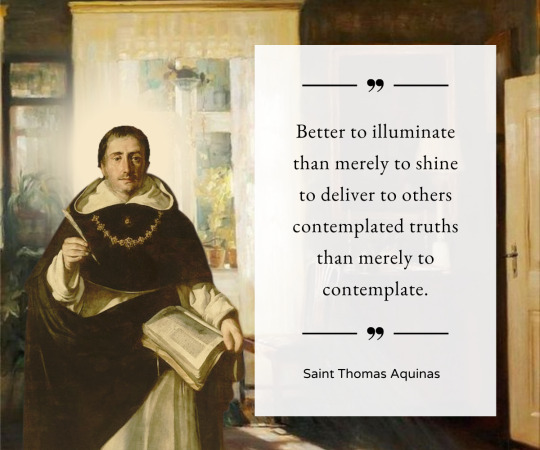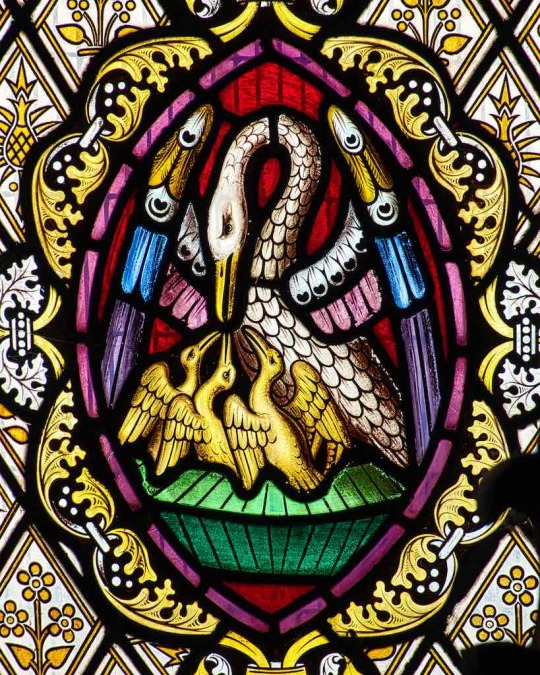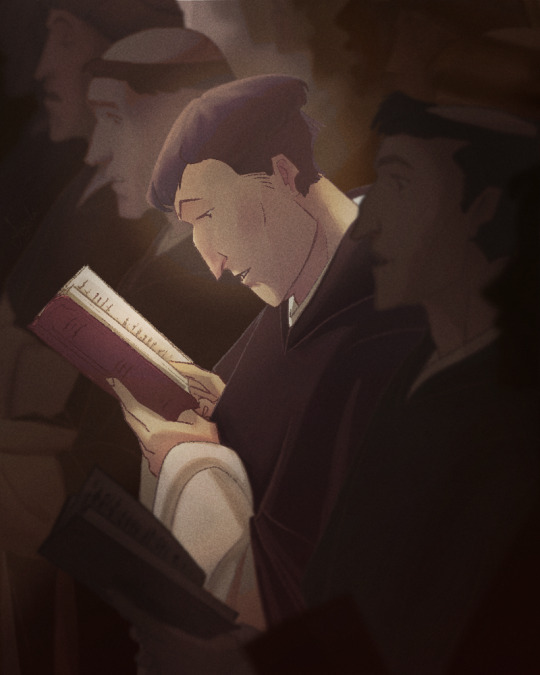#thomas aquinas art
Explore tagged Tumblr posts
Text

#st. thomas aquinas#st. thomas#church#mass#catholic#illuminate#shine#life quotes#philosophy quotes#saint thomas aquinas#thomas aquinas#contemplation#cottage core#light academia#light acadamia aesthetic#art#style#original art#thomas aquinas art#book#literature#famous writers#Christian
13 notes
·
View notes
Text

Title: Saint Thomas Aquinas, Protector of the University of Cuzco Artist: unknown Peruvian artist Date: ca. 1690-95 Genre: religious art Period: Baroque Movement: Cuzco School Medium: oil on canvas Dimensions: 161 cm (63.3 in) high x 117 cm (46 in) wide Location: Lima Art Museum, Lima, Peru
#art#art history#Cuzco School#religious art#Christian art#Christianity#Catholicism#Thomas Aquinas#Saint Thomas Aquinas#Baroque#Baroque art#Peruvian art#Latin American art#17th century art#oil on canvas#Lima Art Museum
572 notes
·
View notes
Text

January 28 . Feast day of St. Thomas Aquinas
Here we see the greatest mind of the church in his natural habit-at.
I decided to make a younger look for him since some of his notable events also happened when he was young.
Happy feast day to the greatest theologian!
#I'm late in posting this because I've been going through some stuff#But I couldn't let the days past without acknowledging the life of the great Doctor Angelicus#Grrrr need to get motivated making character designs again for these saints#🤪#St. Thomas Aquinas#Saints#Christianity#catholic art#my art#my faith#Saint Thomas Aquinas#digital art#want to make more pieces with his life events too
266 notes
·
View notes
Text

Benozzo Gozzoli - Triumph of Saint Thomas Aquinas. 1470 - 1475
423 notes
·
View notes
Text

Saint Thomas Aquinas
Doctor of the Church
1225-1274
Feast Day: January 28 (new), March 7 (Trad)
Patronage: Academics; against storms; against lightning; apologists; book sellers; Catholic academies, schools, and universities; chastity; philosophers; publishers; scholars; students; theologians.
Saint Thomas Aquinas was an Italian Dominican friar and priest. Also honored as a Doctor of the Church, Thomas is considered the Church's greatest theologian and philosopher. Pope Benedict XV declared: "This (Dominican) Order ... acquired new luster when the Church declared the teaching of Thomas to be her own and that Doctor, honored with the special praises of the Pontiffs, the master, and patron of Catholic schools."
Prints, plaques & holy cards available for purchase. (website)
89 notes
·
View notes
Text

Saint Thomas Aquinas by Carlo Crivelli, 1476.
#classic art#painting#carlo crivelli#italian artist#15th century#renaissance#italian renaissance#christian art#saints#thomas aquinas#clergy#saints holding churches#books#yellow background
43 notes
·
View notes
Text


some saint portraits
#postin old art cuz im still in hiatus#my art#catholicism#catholic#religous art#saint thomas aquinas#st. thomas aquinas#fra angelico#beato angelico#will be back with more b&m and tintin fanarts#catholic saints#religion#catholic art
134 notes
·
View notes
Text
Fear is such a powerful emotion for humans that when we allow it to take us over, it drives compassion right out of our hearts.
Thomas Aquinas
#thomas aquinas#aquinas#quotes#philosophy#wisdom#life#literature#writer#books#psychology#write#art#artist#idea#ideas#fear#powerful emotions#compassion#heart
49 notes
·
View notes
Text

St. Thomas Aquinas sketch ofc because we’ve been studying his metaphysics in humanities class 😊
3 notes
·
View notes
Text

“I devoutly adore You, hidden Deity, Who are truly hidden beneath these appearances. My whole heart submits to You, And in contemplating You, it surrenders itself completely. Sight, touch, taste are all deceived in their judgment of You, But hearing suffices firmly to believe. I believe all that the Son of God has spoken; There is nothing truer than this word of Truth. On the Cross only the divinity was hidden, But here the humanity is also hidden. Yet believing and confessing both, I ask for what the penitent thief asked. I do not see wounds as Thomas did, But I confess that You are my God. Make me believe much more in You, Hope in you, and love You. O memorial of Our Lord’s death, Living Bread that gives life to man, Grant my soul to live on You, And always to savor Your sweetness. Lord Jesus, Good Pelican*, wash my filthiness and clean me with Your Blood, One drop of which can free the entire world of all its sins. Jesus, whom now I see hidden,I ask You to fulfill what I so desire: That the sight of Your Face being unveiled I may have the happiness of seeing Your glory. Amen.”
~Hymn “Adoro Te Devote” (“I devoutly adore You), written by St. Thomas Aquinas for the Feast of Corpus Christi
*Christ is called “The Good Pelican” and the pelican is a symbol of Christ because pelicans will, if need be, peck at their own chests and feed their young on their own flesh and blood. ~Via barnhardt.biz
(Art: Victorian stained glass window from a church in Devon, England, via devonchurchland.co.uk)
#Pelican in her piety#symbol for Christ#Christian art#stained glass#Lord Jesus#sacrifice#feast of Corpus Christi#I devoutly adore you#St. Thomas Aquinas#Ann Barnhardt#Good Pelican#Egyptian bird#Hymn
25 notes
·
View notes
Text
The Philosophy of Infinity
The concept of infinity has fascinated philosophers, mathematicians, and theologians for centuries. In philosophy, infinity refers to something that is unbounded or limitless. It challenges our understanding of the world, pushing the boundaries of human cognition and logical reasoning. Here's an exploration of the philosophy of infinity:
1. Mathematical Infinity
In mathematics, infinity is used in various contexts, such as the idea of an endless sequence of numbers, the concept of limits, and the notion of infinite sets. The work of Georg Cantor in the 19th century revolutionized the understanding of infinity by showing that there are different sizes of infinity, known as cardinalities. For instance, the set of all natural numbers is countably infinite, while the set of all real numbers is uncountably infinite, meaning there are more real numbers than natural numbers.
2. Metaphysical Infinity
Metaphysically, infinity often refers to the nature of the universe, God, or other ultimate realities. Philosophers like Aristotle and Aquinas discussed infinity in relation to the nature of the divine. Aristotle distinguished between potential infinity (a process that could continue indefinitely) and actual infinity (a completed state of infinity). Thomas Aquinas later used the concept of infinity to argue for the existence of an infinite being, God.
3. Epistemological Considerations
Infinity also raises epistemological questions about the limits of human knowledge. Can we truly comprehend infinity, or is it beyond the grasp of finite minds? Some philosophers argue that infinity is a useful theoretical construct but cannot be fully understood or visualized. Others suggest that our understanding of infinity is shaped by our cognitive and perceptual limitations.
4. Ethical Implications
The concept of infinity has ethical implications, particularly in the context of moral philosophy. For instance, the idea of infinite value or worth can influence discussions about human dignity and the sanctity of life. If each human life is considered to have infinite value, it could have profound implications for ethical decision-making and the prioritization of resources.
5. Infinity in Cosmology
In cosmology, infinity pertains to the nature of the universe. Is the universe finite or infinite in extent and duration? The concept of the infinite universe has been a topic of debate among philosophers and scientists alike. Some theories in modern physics, such as the multiverse hypothesis, suggest that there could be an infinite number of universes.
6. Infinity in Literature and Art
Infinity also appears in literature and art, often symbolizing the sublime, the eternal, or the boundless. Artists and writers use infinity to evoke a sense of wonder and to explore themes of eternity, the divine, and the limits of human experience.
The philosophy of infinity is a rich and complex field that intersects with many areas of human thought, from mathematics and metaphysics to ethics and cosmology. Infinity challenges us to think beyond the finite and to grapple with concepts that stretch the limits of our understanding. Whether in the precise language of mathematics or the profound reflections of metaphysics, infinity continues to inspire and perplex, pushing us to explore the boundaries of knowledge and existence.
#philosophy#epistemology#knowledge#learning#chatgpt#education#metaphysics#ontology#Philosophy Of Infinity#Mathematical Infinity#Metaphysical Infinity#Ethics#Cosmology#Infinite Universe#Human Knowledge#Georg Cantor#Aristotle#Thomas Aquinas#Infinity In Art#Sublime#Boundless#Eternal#Multiverse#Infinite Value#human psychology#infinity
6 notes
·
View notes
Text

#st. thomas aquinas#st. thomas church#hearts#quotes#catholic saints#traditional catholic#roman catholicism#roman catholic#sspx#tridentine#thomas aquinas art#thomas aquinas#aquinas#saints#famous quotes#inspiring quotes#inspirational quotes#original art#original content#original post#artists on tumblr#fear#humans#emotion#poetry#philosophy#gold#church fathers#doctor of the church#cath
5 notes
·
View notes
Text

A young Thomas during vespers
Thinking of the how every saints at one point had sang, and I just thought of our dear theoligian and what his voice would've sounded like.
#Didn't expect from myself to design a younger version of Thomas but I got inspired#I now just realized I should've drawn him with a Benedictine habit#Yes a full set of hair for Thomas during his 20's#Saint Thomas Aquinas#Saints#Catholic art#my art#digital art#my faith#Christianity#St. Thomas Aquinas#Dominicans
200 notes
·
View notes
Text

Benozzo Gozzoli - Triumph of Saint Thomas Aquinas. Detail. 1470 - 1475
257 notes
·
View notes
Text










aquinas & G-d; 🙏🛐📿✨🇵🇸
#art#poetry#words#dark academia#rhetoric#light academia#web weaving#philosophy tumblr#love#language#thomas aquinas#augustine
2 notes
·
View notes
Text

the erotics of chastity and also all of the really fucked up masochism that catholics got up to in order to be closer to christ etc
#lets talk about thomas aquinas' chastity belt#ngl the art for the temptation of thomas aquinas and the resulting chastity belt should be hornier in its subtext. smh
2 notes
·
View notes